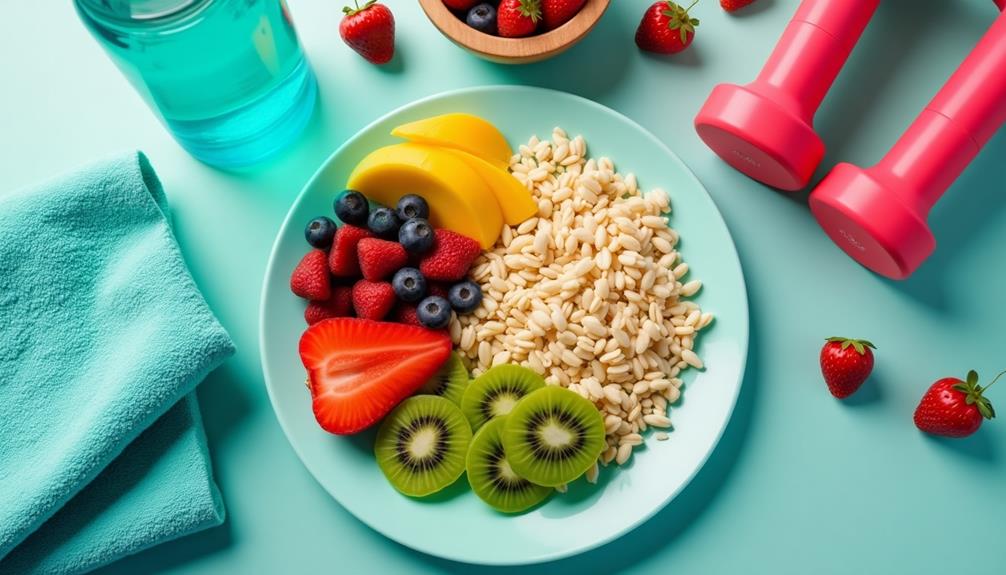To improve your post-workout muscle glycogen levels, start with these tips. First, consume carbohydrates promptly after exercising; this helps replenish glycogen stores. Include protein in your meal, aiming for about 20-30 grams within two hours to aid muscle recovery. Staying hydrated is vital, so drink water or electrolyte beverages. Opt for high-glycemic foods like bananas or white bread to quickly spike insulin levels. Monitor your timing for food intake, as a prompt meal can enhance recovery. Consider glycogen-boosting supplements if needed, and prioritize quality sleep for best recovery. There's plenty more to explore on effective recovery strategies.
Core Insights
- Consume high-glycemic carbohydrates within 30 minutes post-workout to quickly replenish glycogen stores.
- Include 20-30 grams of protein alongside carbs to support muscle repair and synthesis.
- Stay hydrated by drinking water or electrolyte beverages to aid in glycogen synthesis.
- Pair carbohydrates with protein for optimal recovery and enhanced glycogen storage.
- Focus on timing your nutrient intake to prevent delayed replenishment of muscle glycogen.
Consume Carbohydrates Promptly
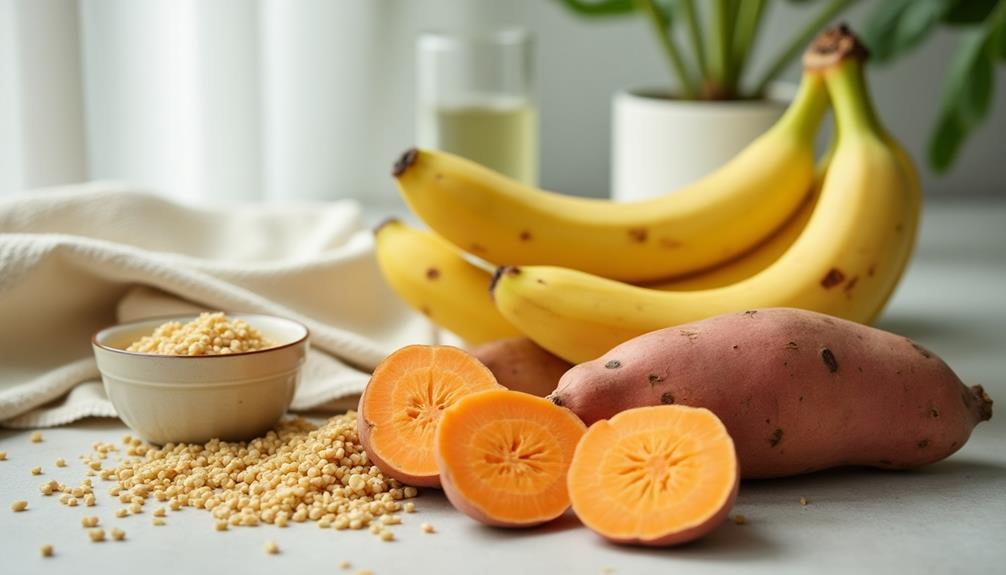
After an intense workout, your muscles are like sponges ready to soak up nutrients, and consuming carbohydrates promptly is vital. Carbohydrates play an important role in replenishing glycogen stores. When you exercise, your body depletes these stores, and refueling them quickly can enhance recovery and performance. Post-workout recovery drinks can be an excellent source of easily digestible carbohydrates, providing a convenient way to replenish glycogen stores on the go.
Aim to consume carbs within 30 minutes to two hours after your workout. Opt for easily digestible sources like bananas, rice cakes, or sports drinks. This quick intake helps your body restore glycogen levels more efficiently.
Don't forget to take into account the amount; a general guideline is 1 to 1.5 grams of carbs per kilogram of body weight. By giving priority to carbohydrate intake, you're setting the stage for better recovery and improved muscle performance.
Include Protein in Your Meal
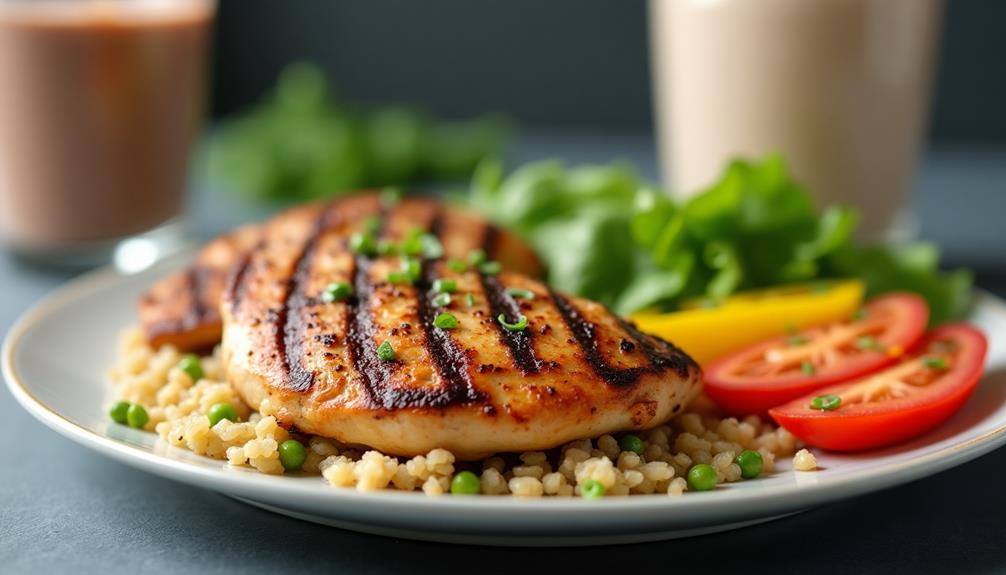
Including protein in your post-workout meal is crucial for muscle recovery and growth. When you exercise, your muscles undergo stress and tiny tears. Consuming protein helps repair these tears, promoting muscle synthesis. Casein protein powder is an excellent choice for post-workout nutrition, as it provides slow-digesting protein that can support muscle recovery for up to 8 hours. Aim for a combination of protein and carbohydrates after your workout. This combination replenishes glycogen stores and provides the necessary building blocks for your muscles.
Good sources of protein include lean meats, fish, dairy, eggs, and plant-based options like beans and tofu. Try to consume around 20-30 grams of protein within 30 minutes to two hours after exercising for the best results. Remember, the right balance of protein will not only aid recovery but also support your overall fitness goals. Prioritize protein in your post-workout meals for the most effective outcomes.
Stay Hydrated
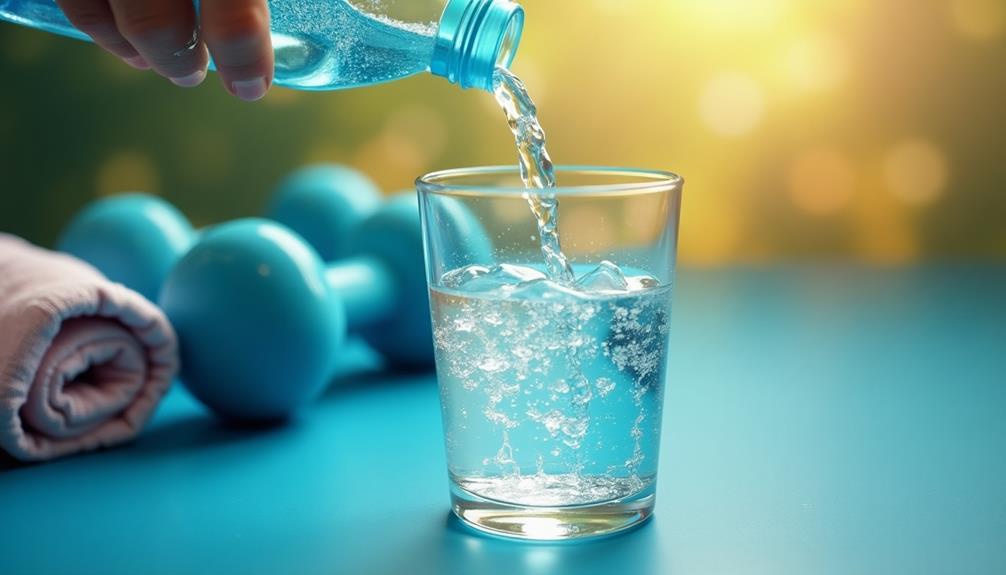
To maximize your post-workout recovery, don't overlook the importance of staying hydrated. Proper hydration helps replenish lost fluids, supports muscle function, and aids in glycogen synthesis. After exercising, aim to drink water or electrolyte beverages to restore balance.
Here's a quick reference table to help you gauge your hydration needs:
| Activity Level | Fluid Intake Recommendation |
|---|---|
| Light Exercise | 0.5 – 1 liter |
| Moderate Exercise | 1 – 1.5 liters |
| Intense Exercise | 1.5 – 2 liters |
| Endurance Training | 2 – 3 liters |
| Hot/High Humidity | 2 – 4 liters |
Opt for High-Glycemic Foods
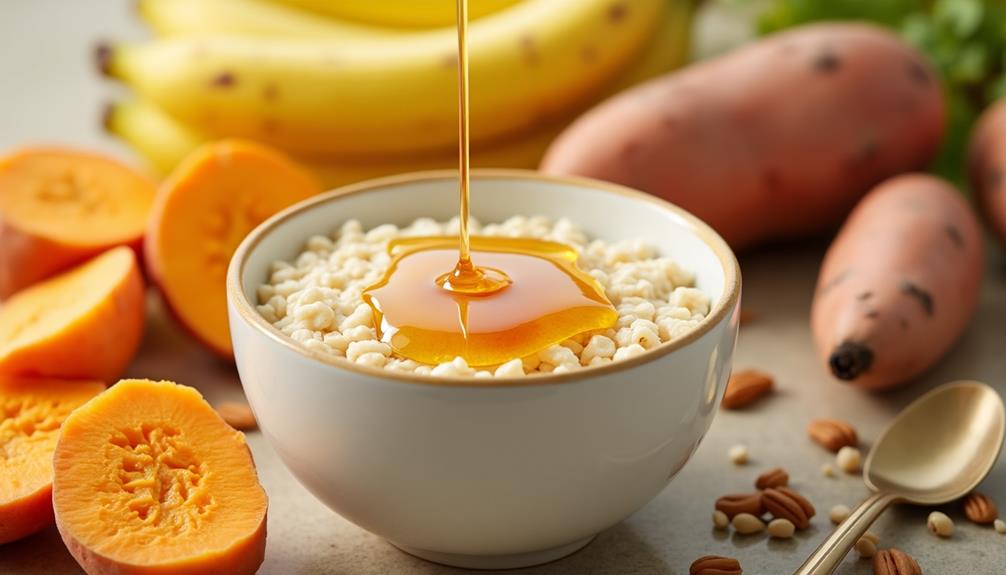
When you consume high-glycemic options, your body can recover faster, especially after intense training sessions. Pairing these foods with a source of protein is crucial to support muscle repair. Coconut water brands like BODYARMOR Strawberry Banana Sports Drink can provide extra electrolytes and vitamins to assist in post-workout recovery. Consider a smoothie with banana and protein powder or a turkey sandwich on white bread.
Monitor Your Timing
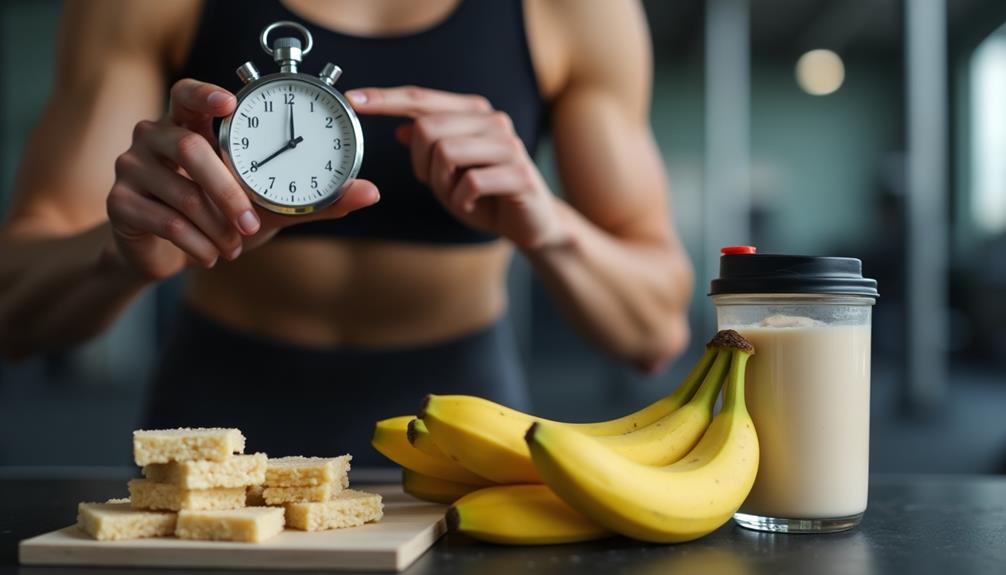
Focus on high-glycemic foods, as they can spike insulin levels, enhancing glycogen storage. Combine these carbs with a source of protein to support muscle repair.
If you wait too long after exercising, the rate of glycogen replenishment slows down. This delay can hinder your recovery and affect your performance in future workouts.
Consider Glycogen-Boosting Supplements
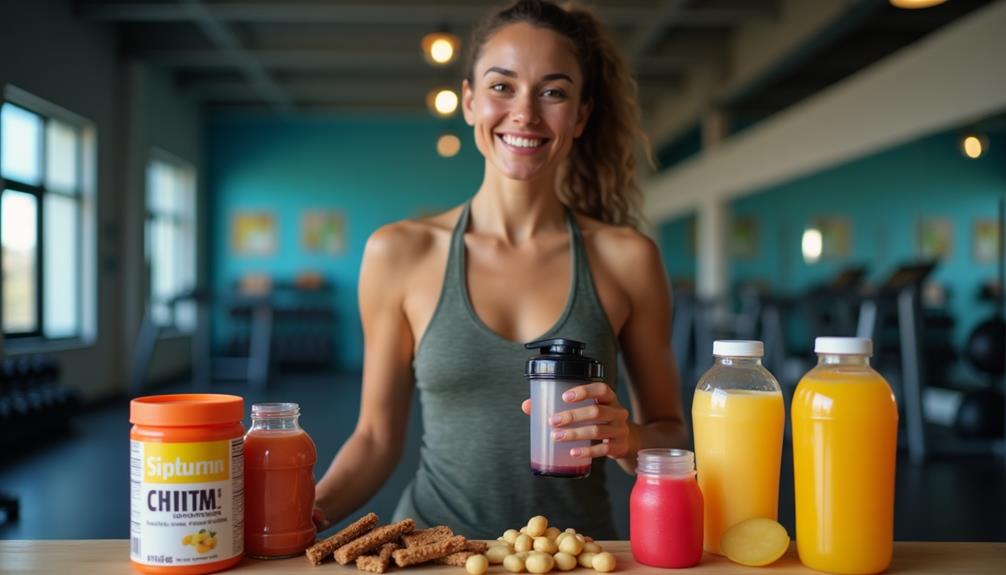
Supplements can play an important role in enhancing your post-workout glycogen replenishment. When you push your body in the gym, it's essential to refuel effectively. Glycogen-boosting supplements can help you recover faster and maximize your results. Here are some options to keep in mind:
- Carbohydrate powders: Quickly digestible carbs to replenish glycogen.
- BCAAs (Branched-Chain Amino Acids): Support muscle recovery and reduce soreness.
- Creatine: Enhances performance and aids in energy production.
- Electrolyte drinks: Help replenish lost minerals and maintain hydration.
- Whey protein: Useful for muscle repair and combining with carbs for best recovery.
Incorporating these supplements can make a significant difference in your recovery process, allowing you to bounce back stronger for your next workout.
Prioritize Sleep and Recovery

Prioritizing sleep and recovery is vital for maximizing your post-workout muscle glycogen levels. When you exercise, your muscles deplete glycogen stores, and adequate rest helps replenish them. Aim for 7 to 9 hours of quality sleep each night. Sleep not only aids recovery but also supports hormone regulation, which is crucial for muscle repair and growth.
In addition to sleep, incorporate active recovery days into your routine. Light activities, like walking or stretching, can improve blood circulation and help transport nutrients to your muscles. Make sure to listen to your body; if you're feeling fatigued, don't hesitate to take an extra rest day. By prioritizing sleep and recovery, you'll effectively enhance your glycogen replenishment and overall performance.
Frequently Asked Questions
How Do Individual Metabolism Rates Affect Glycogen Replenishment?
Imagine a car fueled differently; some roar ahead, while others sputter. Your metabolism's unique pace determines how efficiently you replenish glycogen, affecting energy levels and recovery. Embrace your body's rhythm, and nurture it wisely.
Can I Improve Glycogen Levels With a Vegetarian Diet?
Yes, you can improve glycogen levels with a vegetarian diet. Focus on high-carb foods like whole grains, fruits, and legumes. Combine them with adequate protein sources to support recovery and enhance glycogen replenishment after workouts.
What Role Do Genetics Play in Glycogen Storage Capacity?
Did you know that about 20% of your glycogen storage capacity is influenced by genetics? Your genes determine how efficiently your body stores glycogen, affecting your performance and recovery after intense physical activities.
Are There Specific Foods to Avoid Post-Workout for Better Glycogen Recovery?
You should avoid high-fat and high-fiber foods post-workout, as they can slow digestion and hinder glycogen recovery. Stick to easily digestible carbs and proteins to replenish your energy stores effectively and efficiently.
How Does Age Influence Muscle Glycogen Replenishment Strategies?
As time weaves its tapestry, age subtly shifts how your body replenishes muscle glycogen. You might find that older muscles require more strategic fueling, focusing on nutrient timing and quality to optimize recovery and performance.

